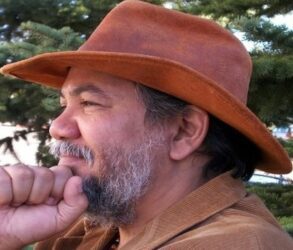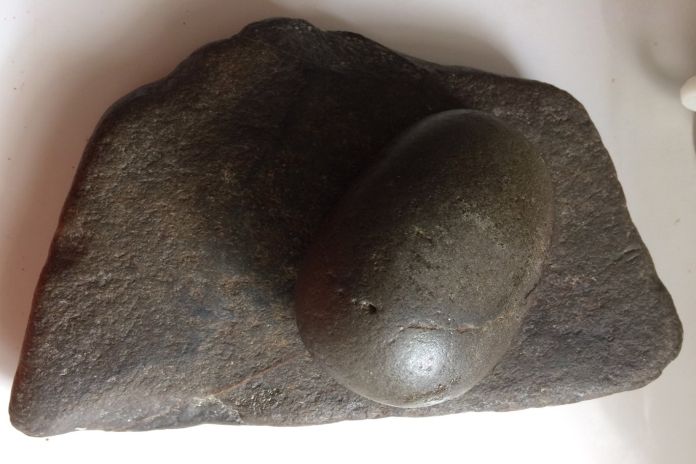By Johnny Coomansingh
On almost every weekend and all my summer vacations I stayed with Neeta, my godmother. She owned a cocoa estate interplanted with coffee, citrus, bananas and miscellaneous fruit trees. Quero, her husband, was a taxi driver who at times helped on the estate. Our friend Claude was the labourer who lived under a cocoa-drying house down the hill from Neeta’s. Claude managed the cocoa plantation of an owner who lived in the Borough of Arima.
After toiling all day in the cocoa field, Claude, my good friend, would come up the hill to my godmother’s clapboard country house to lime (hang out). With the glow of the light from a ‘Home Sweet Home’ kerosene lamp, Claude would partake of a small meal. A large pot of hot homemade chocolate, sweetened with condensed milk, was always available.
Claude would sometimes go down the hill with Boon, Neeta’s nephew, into the cocoa field to hunt for manicou (opossum). They would go especially when the pomerac tree was in fruit. Manicou tend to feast on pomerac. I always wished that I could have gone with them. They told me that I would go with them when I got a little bigger. That expedition never materialized.
After polishing the carbide lamps’ brass-finished reflector to a high luster with Brasso polish, the two hunters securely attached the lamps to their heads and the carbide canister to their belts. With a small but powerful flame emanating through a port in the middle of the reflector, these carbide headlamps literally shone bright as day. No manicou could hide from such a light.
Armed with a 16-gauge shotgun, there were times when they caught two or three manicou, sometimes they returned empty-handed, only seeing a couple of big-eyed, goziey manicou (Manicou gros-yeux), a type of small opossum. On many occasions, the moonlight was welcome, and all in the house waited in expectation of a successful hunt.
Catching a couple manicou was always an exciting moment. Amidst the grapefruit trees that surrounded the house, the large ripe grapefruit reflected the moonlight like bulbs on a Christmas tree. The moonlight facilitated the collection of dry grapefruit tree firewood to start a fire in the chulha (traditional East Indian fireplace or cooking place) situated at the top of a box drain in the yard.
Neeta formed the chulha from a five-gallon Norwegian butter pan using the bottom of the box drain as the base. The chulha helped a lot in saving money which would be spent on propane gas for the kitchen stove. Apart from singeing manicou, chicken, and other animals, many food items, for example, roast breadfruit, boiled chataigne (breadnut), roast coconut bake (fire on top and fire below), cassava pone, and boiled ham at Christmas were cooked on the chulha. Neeta even baked really great tasting sponge cakes inside a large iron pot on the chulha.
The noise of the night in chopping the firewood and lighting up the chulha generated a sense of friendship and togetherness among neighbours. The midnight smell of singeing a manicou and the commotion, the lighting of the flambeau (open-flame light made with a wick immersed in a bottle of kerosene) chopping up the carcass, seasoning and partially cooking the beasts after the hunt was yet another aspect of the sense of place defined by such activities at Neeta’s country house.

For the sumptuous taste that Neeta provided, especially with cooking manicou or any other wild meat, she prepared special seasonings with the proportions remaining a secret. However, Neeta used a variety of herbs and seasonings including garlic, onions, peppercorns, chive, thyme, podina (Cuban oregano), chadon beni (culantro), and slices of fresh, hot Scotch Bonnet pepper pods.
With all the ingredients formed into a heap, Neeta would pisay (grind, crush) the mass of the herbal stuff with a lorha (hard, smooth oval stone) on a sil (large, hard, flat and heavy rock with a recess to accommodate the lorha). In a large enamel basin, the ground-up seasonings and a dash of salt would join the chopped meat and allowed to marinate for about an hour or so.
On the little three-burner stove, Neeta would then bounjay (toss up the meat in hot seasoned oil) the seasoned meat. The absence of a refrigerator was the primary reason why the meat had to be at least pre-cooked. Neeta could not afford any spoilage; meat was expensive, especially wild game.
Two or three stewed manicou could be served for the entire week along with rice and dhal, or boiled ground provisions obtained from the garden such as dasheen, cassava, or white yams. Boiled green bananas, tom-tom (green plantains pounded into a bolus), or steamed breadfruit with coconut milk also formed part of the staples. Fresh orange or grapefruit juice would accompany the meals. Sometimes we just had rainwater.
When the hunting season opened (October 01), Claude would also accompany Quero, Boon and Dohfeh, on weekend hunting trips. Dohfeh was the old man who lived about half a mile away, south of Neeta’s house. He was also a cocoa farmer. Their favourite hunting locations were Mafeking and Bush-Bush forests. Agouti, deer, and lappe were some of the animals they brought home. The same rituals applied in the processing of all captured game animals, and the same bragging continued up into the night, as they relived the moments how they shot each animal.
Agouti was the most popular of the meats. Lappe and deer were a rare treat. These men would hunt for the entire season which ended on the last day of February. Sometimes there would be four to six agouti on the cleaning table. After they were signed, Neeta took care of all of them.
Used in the chase were two to four beagle hound dogs. Quero owned two really young, powerful, and active beagle dogs; Shortboy and Pepsi. They were dogs of good pedigree. These dogs were so good that during their early hunting experience, they chased a buck until they ‘penned’ it. Quero took the shot and approximately 80 pounds of venison fell at his feet. The deer in Trinidad is a small type known as red brocket deer.
Shortboy and Pepsi were kept in separate kennels that were always locked. However, there was one day when disaster struck. With their zeal and power, and the instinct to hunt and kill, they forced the door of their kennels and broke free when no one was around. Apparently, the freedom that the chickens enjoyed around Neeta’s house bothered them.
That fateful day, the dogs chased and slew about 120 chickens; they had a field day. A few of the chickens escaped. When Neeta arrived to feed the dogs and the chickens she was more angry than heartbroken for one of the sources of her income had just about vanished. In her upset state, she went about searching for her dead chickens that filled three large crocus bags.
Processing the dead chickens was the next ordeal she had to undergo. Neeta and Quero were both upset, but what could they do? Hurriedly, Quero packed the trunk of the car with the bags of carcasses and they quickly made their way home to their big house on Oropouche Road to begin the cleaning of the chickens. This house had a supply of potable water that facilitated the processing of the chickens. Neeta was mad; incensed. After boiling a huge pot of water for soaking the chickens she stood in front of the kitchen sink for well over four hours plucking, gutting, chopping, separating, and bagging every chicken for storage in the freezer space she rented from the grocer where she sold her common fowl eggs.
Quero did not help her, but he had common fowl meat to eat every day for about two or three months. The house smelled like a chicken processing depot for days. Such things do happen; hunting dogs are bred to hunt. In Trinidad, there is a saying: “Yuh cyar play mas if yuh ‘fraid powder.” The surviving chickens served to raise another huge flock.
With the new clutch of pullets and roosters clucking, crowing, and scratching around, I had the odious task of cleaning up the yard around the country house, and the chickens were not helping me. I had to remove several stinky, bunches of half-rotted, fly-infested, half-eaten bunches of Mysore bananas that Neeta left around as a feed supplement for her chickens. Not only that, but I had to, with a hoe and shovel, scrape of the chicken droppings that dotted the yard.
Soon enough, the removal of the chicken poop was no longer my work. I noticed that the droppings were quite scanty when I came out to clean the yard. It appeared that Neeta’s newly acquired ‘pot hound’ puppy was having a feast. That dog relished the taste of chicken poop.
Neeta ‘paytayed’ (watched closely) for him as he sneakily licked the chicken crap from off the ground. Caught in the act, Neeta held him down with his little nose pressed into a load of the filth and delivered a good ‘cut tail’ on him as she simultaneously christened him Caca Mange (filth eater). Nevertheless, Caca Mange, so used to his habit, continued to eat fowl crap daily. In Trinidad, the saying goes, ‘when dog sucking egg, dey always sucking egg.’ It seems that this statement applies to everything including chicken poop. Despite his habits and misfortune with floggings and rebuffs, Caca Mange welcomed Claude and everyone else to his home up the hill. Claude would call out to him, “Caca Mange!” and he would come running down the hill madly wagging his tail.
No one was actually privy to Claude’s trials, his pains, his suffering, his dehumanisation or his dire economic circumstances. His boss, the owner of the cocoa estate was arrogant. Claude seemed to be afraid of him. Claude talked little, sometimes expressionless and Neeta did not pry into his affairs. However, for a few dollars, there were times when Claude would offer to give Neeta a ‘pull out’ (a little help) with the harvesting of bananas.
On Thursdays of every week, Neeta sold bananas to the government-owned Control Board. As a former British colonial establishment, the office and storage facilities of the Control Board were located adjacent to the Civic Center and the Public Transport Service Corporation (PTSC) bus station on Brierley Street, Sangre Grande.
The board offered guaranteed prices for the certain varieties of bananas, including Silk, Sucrier or Chiquito, Gros Michel, Lakatan and Cavendish. A couple of these varieties, we believed, were part of the bananas shipped to Europe. The bunches were treated with great care. Bruised bananas would be rejected. Dried banana leaves were cut and placed on the roadside as bedding and covering for the bunches.
I could see the trickery in Neeta’s eyes as she cut the banana bunches with extremely long stems with the net aim of deriving the heaviest weights possible for each bunch. Much to her chagrin, her dreams of making a few cents more with the supposed weights of the long stems were constantly dashed to pieces every week. The buying agent would take out his knife and de-stem every bunch before weighing.
After the ‘excisions’ Neeta’s countenance would change drastically. She became filled with disgust for the buyer, and her sighs of defiance said it all. There were times when she tried to convince the buyer to pay for all bunches but much to her disappointment, the damaged ones were left as rejects. Out of this money, Claude received a dollar or two. (Excerpt adapted from my book titled: Cocoa Woman).





